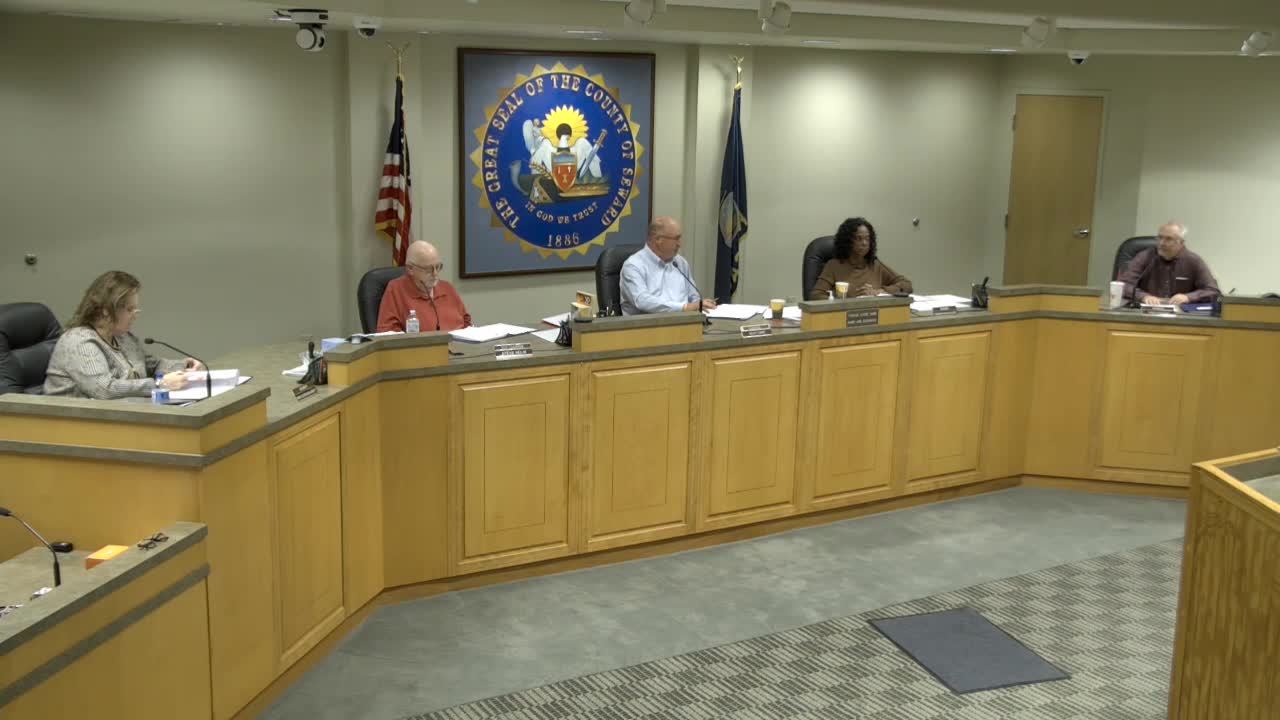Seward County commissioners debate revisiting 2026 budget amid public criticism
October 06, 2025 | Seward County, Kansas
This article was created by AI summarizing key points discussed. AI makes mistakes, so for full details and context, please refer to the video of the full meeting. Please report any errors so we can fix them. Report an error »

Commissioners at a Seward County meeting debated whether to revisit and reduce the 2026 budget after residents and some commissioners expressed strong negative reactions to the approved plan.
The discussion centered on reserve and contingency balances. Commissioner comments and auditor verification indicated the county had set aside $1,000,000 carried over from the current year and budgeted an additional $1,500,000 for 2026—for a total set-aside of $2,500,000. Commissioner comments showed disagreement over whether that amount and other elements of the budget were appropriate given concerns about local economic impacts and possible tax mill increases.
One commissioner called for re-examining reductions and said options such as “no-fund warrants” exist but are not guaranteed. Another commissioner pushed back sharply, noting the board had held eight budget workshops and had already made multiple cuts. The same commissioner said employee benefits and staffing changes had been previously discussed and reduced during workshops.
Auditor Dustin Ormiston was cited during discussion to verify the rollover and budget figures. Commissioners also raised concerns about county reserves, the effect of the budget on the local real estate market and whether the county had adequately explained numbers during prior public sessions. Several commissioners criticized public comments that, they said, relied on incomplete or second‑hand information rather than figures verified at budget sessions.
No motion to amend the adopted 2026 budget was made or approved at the meeting. Several commissioners urged that any substantial reconsideration be preceded by a special session and staff-provided analyses; others said the eight prior workshops had afforded ample opportunity for input and that the matter had already been decided by a 3–2 vote during the approval process.
Commissioners requested follow-ups including periodic reports on receivables aging for departments (landfill, waste haul and others) and a plan to meet with the county auditor to review the final audit in detail. The board scheduled an audit review and indicated it will bring receivables reports back on a recurring schedule so departments’ outstanding balances are monitored more frequently.
The discussion centered on reserve and contingency balances. Commissioner comments and auditor verification indicated the county had set aside $1,000,000 carried over from the current year and budgeted an additional $1,500,000 for 2026—for a total set-aside of $2,500,000. Commissioner comments showed disagreement over whether that amount and other elements of the budget were appropriate given concerns about local economic impacts and possible tax mill increases.
One commissioner called for re-examining reductions and said options such as “no-fund warrants” exist but are not guaranteed. Another commissioner pushed back sharply, noting the board had held eight budget workshops and had already made multiple cuts. The same commissioner said employee benefits and staffing changes had been previously discussed and reduced during workshops.
Auditor Dustin Ormiston was cited during discussion to verify the rollover and budget figures. Commissioners also raised concerns about county reserves, the effect of the budget on the local real estate market and whether the county had adequately explained numbers during prior public sessions. Several commissioners criticized public comments that, they said, relied on incomplete or second‑hand information rather than figures verified at budget sessions.
No motion to amend the adopted 2026 budget was made or approved at the meeting. Several commissioners urged that any substantial reconsideration be preceded by a special session and staff-provided analyses; others said the eight prior workshops had afforded ample opportunity for input and that the matter had already been decided by a 3–2 vote during the approval process.
Commissioners requested follow-ups including periodic reports on receivables aging for departments (landfill, waste haul and others) and a plan to meet with the county auditor to review the final audit in detail. The board scheduled an audit review and indicated it will bring receivables reports back on a recurring schedule so departments’ outstanding balances are monitored more frequently.
View full meeting
This article is based on a recent meeting—watch the full video and explore the complete transcript for deeper insights into the discussion.
View full meeting
